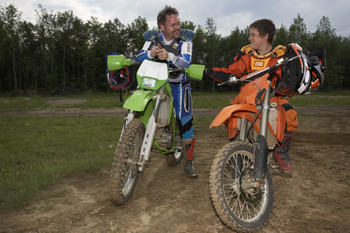Yearning for a perfect father (part 3)

Third in a series on fathering
We all incur wounds at the hands of our fathers. Even the best fathers have their shortcomings, leaving some sort of painful memory in the minds of their child that at some point bubbles to the surface.

Fathers, with their inherent strength, are the protectors of the tribe. Historically, they have built homes and put up fences and stocked the shelves at a time when mothers were bearing children and nurturing them.
Unfortunately, children are at their most vulnerable when fathers are still in the process of “growing up.”
For many people, their flaws
are in direct correlation to the role our father did (or did not) play. These wounds are very real and require attention. Somewhere along the way in life we began to settle upon these shortcomings as the reason for our own inadequacies. It almost seems as though it is part of growing-up to find out the ways in which our fathers hurt us and to link them up with our character flaws.
But our hurts stem in part from the idealistic picture of a father that we develop and then compare with our own all-too flawed father. The problem is that this perfect standard simply doesn’t exist in nature. It’s worth considering whether our picture of “perfection” should perhaps include a few flaws as well. Yes, inevitably our father hurt our feelings, made wrong decisions in guiding us, and made mistakes that impacted us. But all fathers do this – many of us need to cut our father and ourselves a break.
The beauty of a relationship with our God as Father is that he gets to fill in the blanks. In the midst of our hunt for the “father wound,” we need to remember that our father wounds are opportunities to receive comfort, healing, and encouragement from our heavenly Father.
It’s worth noting how important a discipleship relationship can be in helping us work thru this issue. Broken people often do not know what they need to do to become mended. Disciplers can bring the outside perspective that helps fill in the gaps.
Comments (2)
Leave a Reply Cancel reply
More Posts
![]()



“In the midst of our hunt for the “father wound,” we need to remember that our father wounds are opportunities to receive comfort, healing, and encouragement from our heavenly Father”
I am touched! I am experiencing it now and so I know what this exactly means! Thanks a lot Seth! GBU.
Sometimes it’s not so easy or even remotely possible to forgive someone, especially if the wounds are deep and many. I can’t even count how many days and nights I spent crying over the things my father did and the painful feelings he invoked. I don’t want to get into all the emotional details, but how many times can you make someone feel so low and unloved before that person can no longer have any warmth in her/his heart for you? Especially when the people around you who have witnessed those acts constantly remind her/him?
Also, it would help if once in a while you’d turn around, swallow your pride and say you’re sorry. You don’t have to be sorry for a specific event… just sorry in general. It’s especially important to not only apologize but to try your hardest to not make the same mistakes again. I know that if my own father followed those two suggestions he wouldn’t be stuck with such a non-existant relationship with his daughter (me).